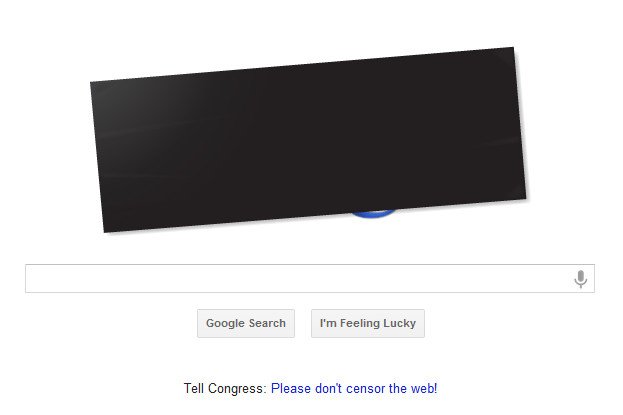Google's homepage on Jan. 18, in protest of the proposed SOPA and PIPA legislation in Congress.
WASHINGTON, Jan. 18 (UPI) -- Two Republican senators dropped their support Wednesday for bills aimed at curbing piracy on the Internet, saying the bills are badly designed.
The change of heart by Marco Rubio, R-Fla., and Jim DeMint, R-S.C., came as Web sites, including Wikipedia, shut down in a one-day protest, The Hill reported. Others, like Google, stayed up but posted information on the bills and urged users to protest them.
At least four West Coast Democratic members of the U.S. House of Representatives -- Zoe Lofgren, Mike Honda and Anna Eshoo of California, and Earl Blumenauer of Oregon -- posted messages on their official Web sites or temporarily blacked out their sites to show support for the Internet protest, Roll Call reported.
"It's inspiring to watch so many Internet users and creators stand up for the future of the Internet," Lofgren said. "That is precisely what's at stake in the battle over SOPA and PIPA."
Roll Call said some other members of Congress had their Web sites overwhelmed by traffic generated through search engines such as Google and direct links from Wikipedia.
DeMint, in a tweet, called the legislation now before Congress "misguided bills that will do more harm than good." Rubio said he had been a co-sponsor of the Protect Intellectual Property Act or PIPA, the Senate version, but now believes it needs to be rewritten to preserve an open Internet.
Former U.S. Chris Dodd, D-Conn., chairman and chief executive officer of the Motion Picture Association of America -- the film industry's top lobbying arm -- called the brief blackout campaign a dangerous "gimmick."
"Only days after the White House and chief sponsors of the legislation responded to the major concern expressed by opponents and then called for all parties to work cooperatively together," Dodd said in a statement posted on the MPAA Web site, "some technology business interests are resorting to stunts that punish their users or turn them into their corporate pawns, rather than coming to the table to find solutions to a problem that all now seem to agree is very real and damaging."
A number of members of Congress from both sides of the aisle had positions similar to Dodd's. Sen. Patrick Leahy, D-Vt., said critics do not understand the legislation.
Wikipedia, the online encyclopedia, the 10th-most popular Web site in the United States, shut down its English-language services and replaced its familiar homepage with a black page emblazoned with a big shadowed "W" and a headline, "Imagine a World Without Free Knowledge."
"For more than a decade, we have spent millions of hours building the largest encyclopedia in human history," the page said. "Right now, the U.S. Congress is considering legislation that could fatally damage the free and open Internet. For 24 hours, to raise awareness, we are blacking out Wikipedia."
The proposed bills are intended to curb unlawful online downloading and streaming of TV shows and movies.
The tech industry alleges the bills would give media companies too much power to shut down Web sites they say abuse copyrights.
For instance, under the legislation, if copyright holders such as Warner Bros. or 20th Century Fox discover a foreign Web site offers illegal copies of songs or movies, they could ask a court to require search engines such as Google to remove links to that foreign site and require advertising companies to cut off payments to the site.
Craigslist, a classifieds site, put up a black homepage saying, "imagine a world without craigslist, Wikipedia, Google, [your favorite sites here] ..."
The page offered information about the proposed laws and scolded "corporate paymasters" to "keep those clammy hands off the Internet!"
Google's Web site said, "Millions of Americans oppose SOPA and PIPA because these bills would censor the Internet and slow economic growth in the U.S."
The sites asked visitors to sign a petition and write to lawmakers in Washington urging them to defeat the legislation.
The online protest included thousands of Web sites, including Reddit, a compendium of links to news reports, personal stories and funny pictures, and icanhazcheeseburger.com, a collection of funny cat pictures.















